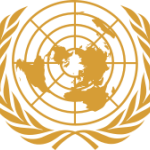- Branża: NGO
- Number of terms: 31364
- Number of blossaries: 0
- Company Profile:
The United Nations Organization (UNO), or simply United Nations (UN), is an international organization whose stated aims are facilitating cooperation in international law, international security, economic development, social progress, human rights, and the achieving of world peace.
Useless and sometimes hazardous material with low liquid content. Solid wastes include municipal garbage, industrial and commercial waste, sewage sludge, wastes resulting from agricultural and animal husbandry operations and other connected activities, demolition wastes and mining residues.
Industry:Environment
The concept refers to (a) use of the biosphere by present generations while maintaining its potential yield (benefit) for future generations; and/or (b) non-declining trends of economic growth and development that might be impaired by natural resource depletion and environmental degradation.
Industry:Environment
Highly adsorbent form of carbon used to remove odours and toxic substances from liquid or gaseous emissions. In industrial waste-water treatment, it is used to remove dissolved organic matter from waste water. It is also used in motor vehicle evaporative control systems. See also adsorption.
Industry:Environment
Factors used to convert quantities from their original physical units into a common accounting unit for the purpose of aggregating energy sources or assessing "contributions" to environmental problems from diverse sources (for example, the contribution of different pollutants to global warming).
Industry:Environment
Direct or indirect introduction by humans of substances or energy into the marine environment (including estuaries), resulting in harm to living resources, hazards to human health, hindrances to marine activities including fishing, impairment of the quality of sea water and reduction of amenities.
Industry:Environment
General term for the global environmental assessment efforts of the United Nations system as coordinated by the United Nations Environment Programme to improve the gathering and sharing of environmental information and provide early warning of environmental problems requiring international action.
Industry:Environment
Any form of deposition on water, land and other surfaces that increases their acidity by contamination with acid pollutants, such as sulphur dioxide, nitrates and other acids. The deposition can be either dry (as in the adsorption of acid pollutants to particles) or wet (as in acid precipitation).
Industry:Environment
Characteristic activities include (a) collection, transport, treatment and disposal of waste, (b) control, monitoring and regulation of the production, collection, transport, treatment and disposal of waste and (c) prevention of waste production through in-process modifications, reuse and recycling.
Industry:Environment
Disease contracted through exposure to water containing a species of water snail that acts as host to flukes of the genus Schistosoma at their first larval stage. The disease leads to malfunctioning and deterioration of the liver, heart, spleen, bladder and kidneys. It is also known as bilharzia.
Industry:Environment
Conceptual framework that assists in the development, coordination and organization of environment statistics and related socio-economic and demographic statistics. It was developed by the United Nations Statistics Division in 1984, and is based on stress-response principles of environmental impacts.
Industry:Environment
